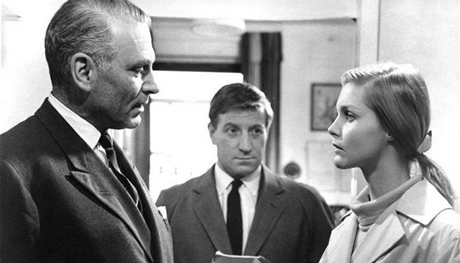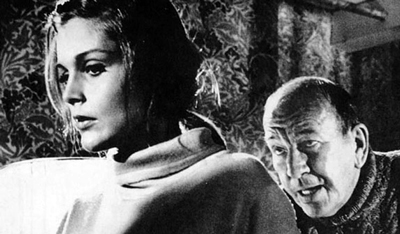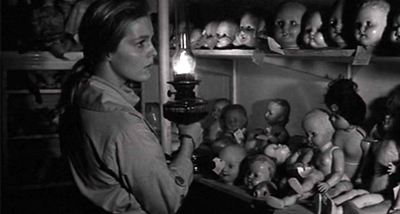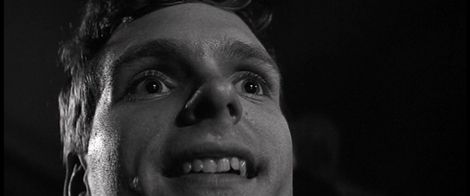Reviewed by Glenn Erickson
Producer-director Otto Preminger sometimes took years to develop his movie ideas. He optioned Bunny Lake is Missing for production in 1958 and spent six years plus a small fortune commissioning draft screenplays from a string of well-paid writers: Walter Newman, Charles Beaumont, Ira Levin, Dalton Trumbo, Arthur Kopit and finally John and Penelope Mortimer. At its inception Bunny Lake was a straight mystery-kidnapping crime tale. Preminger and the Mortimers 'solved' the film's story problems by tilting it in the direction of the newer psychological horror trend seen in Psycho and What Ever Happened to Baby Jane?
Preminger's previous four movies were all sprawling epics. The much smaller Bunny Lake shapes up as their equal despite an ending that seems a letdown after 100 minutes of rising suspense. Preminger seems to enjoy stacking his cast with top London stage talent. All give memorable performances, especially Laurence Olivier as the detective in charge. His circumspect, civil presence keeps us interested in a mystery that might otherwise be an exercise in frustration.

Unwed mother Ann Lake (Carol Lynley) arrives in London to be near her brother Steven (Kier Dullea), a magazine correspondent. When she arrives to pick up her daughter Bunny from her first day at preschool, the child is nowhere to be found. Worse, nobody remembers seeing Bunny. Steven arrives to help search, tempers rise, and finally the police are summoned in the persons of Superintendent Newhouse (Laurence Olivier) and his assistant Andrews (Clive Revill). It seems impossible, but the immediate evidence points to the possibility that Ann invented the little girl. Bunny's half-unpacked personal belongings have disappeared from the new apartment and Ann cannot find a single person to vouch that the girl exists. Newhouse interviews a number of eccentric suspects. Ada Ford (Martita Hunt of The Brides of Dracula) lives upstairs in the school and records audiotapes of children talking about their nightmares. Ann's landlord Wilson (Noel Coward) is a lecherous busybody. The school cook (Lucie Mannheim) quit her job at the same time Ann claims Bunny must have disappeared. Newhouse notes the closeness between Ann and her brother Steven, a relationship that seems more like a marriage. Steven has never seen Bunny either, and behaves as if Ann were incapable of taking care of herself. The police work tirelessly through the day while Newhouse weighs the evidence for and against the existence of little Bunny. What is going on here?
Perhaps Otto Preminger's last really good movie, (!) Bunny Lake is also one of the last big productions filmed in B&W. The polished cinematography makes us nostalgic for the streets of a London long gone, that most of us never saw in person. Preminger and cameraman Denys Coop shoot in impressive real locations. Bunny's preschool looks too real to be a set, what with a bulky Panavision camera snaking through narrow corridors and up a tight stairway. The creepy décor in Ann's new apartment seems a bit much until we meet the landlord that put them there. A real hospital interior provides spooky dark hallways and a room holding caged experimental animals. And somebody couldn't resist making Ann use a flashlight to search through a room stacked with broken dolls. Might the dolls symbolize the mystery of a child that may not exist? Is this where the spirits of murdered children come to rest? Is Otto Preminger bald?
 Bunny Lake's surface is too realistic for us to ask why the repair shop has so many unclaimed dolls on its shelves. The camera is constantly prowling and craning about, as if on its own search for the missing child.
Bunny Lake's surface is too realistic for us to ask why the repair shop has so many unclaimed dolls on its shelves. The camera is constantly prowling and craning about, as if on its own search for the missing child.
With a cast composed of prestigious Brit actors, the volatile Preminger had to limit his legendary cruelty to Kier Dullea, who apparently held up better under stress than had Tom Tryon in The Cardinal. Dullea is good playing a guy we don't like too much -- Steven Lake dominates his sister and is prone to boorishly premature, ineffectual accusations. Noel Coward appears to be having too much fun slobbering over poor Carol Lynley, and is so grotesque that he even creeps out the cops. Martita Hunt's interest in children definitely has a malicious potential; Ann thinks the old lady is crazy the moment she sees her. Actors associated with great work are slotted into the minor roles, and even bits. Old-timer Finlay Currie is a dotty repairer of dolls. Anna Massey (Peeping Tom) is the nervous, defensive manager of the preschool. Clive Revill (Avanti!) is history's most patiently attentive cop and sweet Megs Jenkins (The Innocents) has a tiny bit as a nurse.
The ubiquitous Richard Wattis is perfect as an inconvenienced clerk while David Oxley and Victor Maddern show up in small bits. The most interesting participant is German Lucie Mannheim, who has a couple of scenes as the disgruntled middle-aged cook. Thirty years before, Mannheim played the exotic mystery woman murdered early on in Hitchcock's The Thirty-Nine Steps. Wonders never cease.
'Screaming Otto' Preminger presumably couldn't shout at or threaten the hundred or so little children we see. Yes, some cute tykes look at the camera during takes. Most seem entirely natural even with a film crew staring down their throats.
It takes a few scenes to warm up to Carol Lynley, whose Ann lacks key mothering skills. I don't think any woman, even in 1965, would consider dropping off her child anywhere without a firm hand-over, and certainly not to that distracted, unfriendly cook. But nobody's perfect, and by the finale Ann is showing off the kind of Rosemary Woodhouse spunk and ingenuity we like to see. Lynley carries most of her part quite well, especially considering that poor Ann is never farther than one or two steps from total panic. Kier Dullea usually makes a better impression in a quieter, more intimate situation, yet here he's more than convincing in the difficult final scenes. One might imagine Anthony Perkins in the part, yet being a very bad choice. Dullea's manner matches that of Lynley's -- they really do look like brother and sister. Dullea happily repeats an anecdote that would shrivel a less self-confident actor. When meeting the legendary Noel Coward for the first and only time, the older star snapped at him, "Ah! Keir Dullea, gone tomorrow!"
That Ann should be unable to think of a way to prove that her daughter exists strains credibility. Credit for keeping this concept afloat must go to top-billed Laurence Olivier, who scales his performance to the needs of the role with consummate skill. His Superintendent carefully and thoughtfully conducts the investigation far beyond what one would think feasible. He's equally perplexed by the lack of evidence that Bunny doesn't exist. True, a blind man would intuit something off-kilter between Ann and Steven, but we're given
 precious few normal people in the movie to compare them to -- at times England appears to be one big nuthouse. On the other hand, the civilized image presented of the London police makes us wish we could move there, today. Three detectives and a dozen bobbies put in a full, unbroken day getting to the bottom of Ann's problem. All are charming, courteous and discreet, and in the case of Newhouse extremely tolerant of Steven's bad behavior. Just when we think Newhouse will give up, he redoubles his efforts.
precious few normal people in the movie to compare them to -- at times England appears to be one big nuthouse. On the other hand, the civilized image presented of the London police makes us wish we could move there, today. Three detectives and a dozen bobbies put in a full, unbroken day getting to the bottom of Ann's problem. All are charming, courteous and discreet, and in the case of Newhouse extremely tolerant of Steven's bad behavior. Just when we think Newhouse will give up, he redoubles his efforts.
For the ending of Bunny Lake Preminger amps up the strange angles and swings his camera with the motions of the characters. I don't know of another film by this director, yet we're seldom limited to Ann's subjective experience. The scoffing women at the preschool are soon discredited, and Superintendent Newhouse takes her anxiety very seriously. When Ann starts to question her own sanity, mystery fans will wonder if this might be a modernized spin on the Gaslight format. But who would benefit from stealing Bunny, and making it seem as if Ann had lost her mind? If Newhouse didn't assure Ann that her status as a single parent makes no difference, we'd worry that Bunny Lake might become a tract against unwed mothers. In 1965, that angle was definitely a major issue with mainstream audiences.
The Twilight Time Blu-ray of Bunny Lake is Missing is a perfect HD encoding that reminds us just how good B&W can look. Preminger achieves a heightened sense of reality simply by backing his camera off a little and letting us observe what's happening in the margins. His judgment for camera movement is so good that we become more involved in scenes rather than more conscious of the camera (at least when little kids aren't staring at it).
The image is rich and detailed, with deep blacks in all of the nighttime scenes. The crisp audio and diction of the English actors makes every line of dialogue come across clearly. The music by Paul Glass (Overlord) is also presented on an Isolated Score track.

The extras show Preminger using a personal touch to promote his movie. He hosts and narrates one trailer with his thick "Mr. Freeze" Viennese accent, staring down the camera just like William Castle. The Saul Bass-designed credits and title treatment are reminiscent of What Ever Happened to Baby Jane? with the absent child suggested by the shape of a hole torn out of a piece of construction paper. The design isn't as creepy as Baby Jane's nightmarish broken doll's head.
TT has given the show one of their casual feature commentaries, with Nick Redman and Julie Kirgo offering facts and observations, along with their frequent guest, screenwriter friend Lem Dobbs (The Limey). Dobbs is especially sensitive to story construction.

A second standard trailer is present along with a third novelty trailer in which the British Invasion rock group The Zombies "sing" the promo narration. This may have impressed Italian director Pier Paolo Pasolini, who in his next year's film Hawks and Sparrows (Uccellaci e uccellini) had the entire credits sung by pop star Domenico Modugno, to music by Ennio Morricone.
I don't know if the Zombies' trailer was ever used. Their appearance in the movie (9th billing) was touted in all the advertising, but they're only seen on a small TV in a bar, and heard only once again from a janitor's radio. Many a music fan must have felt cheated. Mad magazine even made a joke of this in their spoof of the movie.
Research: Otto Preminger: The Man Who Would Be King by Foster Hirsch. Knopf, 2007
On a scale of Excellent, Good, Fair, and Poor,
Bunny Lake is Missing Blu-ray rates:
Movie: Very Good +
Video: Excellent
Sound: Excellent (mono)
Supplements: Isolated Paul Glass Score Track, feature commentary with Lem Dobbs, Julie Kirgo, Nick Redman,Theatrical Trailers, Julie Kirgo liner notes
Deaf and Hearing Impaired Friendly?
YES; Subtitles: English
Packaging: Keep case
Reviewed: November 24, 2014
Footnote:
1. The Ann-Steven relationship is given definite incestuous overtones, something not often seen in older American pictures -- The Strange Affair of Uncle Harry comes to mind. The most obvious flag drops when Ann walks casually in on Steven when he's taking a bath. Other details crop up to suggest that they have a very close rapport. Preminger was noted for pushing the limits for daring subject matter. But for 'incest curiosity', Bunny Lake is nothing compared to Jean-Pierre Melville's Les enfants terribles, made back in 1950. Nothing's explicit there either, yet the drift is impossible to miss.
Return

Text © Copyright 2014 Glenn Erickson
See more exclusive reviews on the Savant Main Page.
Reviews on the Savant main site have additional credits information and are often updated and annotated with reader input and graphics.
T'was Ever Thus.
Return to Top of Page
|

